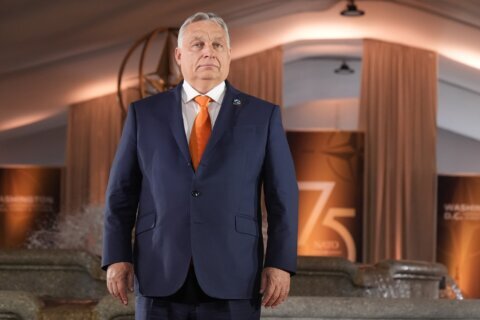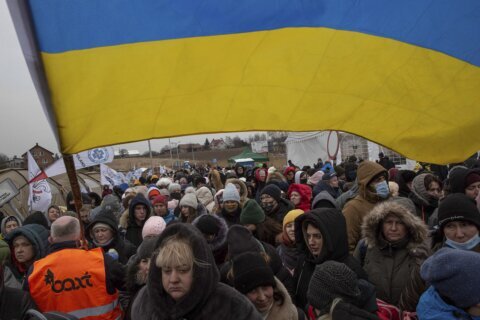TALLINN, Estonia (AP) — Over the past decade, Russia has seen a sharp increase in treason and espionage cases.
Lawyers and experts say prosecutions for these high crimes started to grow after 2014 — the year that Russia illegally annexed the Crimean Peninsula from Ukraine. That’s also when Moscow backed a separatist insurgency in eastern Ukraine.
The number of treason and espionage cases in Russia really spiked after the Kremlin sent troops into Ukraine in February 2022, and President Vladimir Putin urged the security services to “harshly suppress the actions of foreign intelligence services (and) promptly identify traitors, spies and saboteurs.” The crackdown has ensnared scientists and journalists, as well as ordinary citizens.
A look at some treason cases prosecuted in Russia in recent years:
Oksana Sevastidi
In April 2008, bakery worker Oksana Sevastidi saw military equipment on the railway near Sochi, the Russian Black Sea resort where she lived. She texted a friend who lived in neighboring Georgia about it. Weeks later, in August, the two countries fought a brief war, which ended with Moscow recognizing South Ossetia and another Georgian province, Abkhazia, as independent states and bolstering its military presence there.
Sevastidi was arrested in 2015, stemming from her text messages, and convicted of treason the following year. The case made national headlines after Ivan Pavlov and Evgeny Smirnov, prominent lawyers specializing in treason cases, took it on in 2016. That same year, Pavlov’s team revealed that several other Sochi women were convicted of treason in eerily similar cases.
President Vladimir Putin was asked about Sevastidi at his annual news conference in December 2016. He called her sentence “harsh” and promised to look into it, saying that “she wrote what she saw” in her texts and that it didn’t constitute a state secret. In 2017, Putin pardoned Sevastidi and two other women.
Ivan Safronov
Ivan Safronov, a former journalist who went on to work for the Russian space agency Roscosmos, was arrested in 2020 and accused of passing military secrets to Czech intelligence and a German national. In September 2022, a court in Moscow convicted him of treason and sentenced him to 22 years in prison.
Safronov rose to prominence as a military affairs reporter for Kommersant, a leading business newspaper. He vehemently rejected the charges against him, arguing that he collected all the information from open sources as part of his journalistic work and did nothing illegal.
Colleagues denounced the verdict as unfounded and pushed for Safronov’s release, suggesting authorities may have wanted to punish him for his reporting about military and space incidents and arms deals.
His fiancee, Ksenia Mironova, told The Associated Press that she believes such treason cases, which are investigated in secret with trials held behind closed doors, are convenient for law enforcement because their accusations can go unchallenged:
“They don’t have to explain anything to anyone at all. Not that they bother anyway. … But (with open trials), there is still a chance that some unfortunate journalists will come and write something. With treason, the case is closed, and they can just concoct something, and that’s it,” said Mironova, who also is a journalist and has reported on the rise of treason prosecutions.
Valery Golubkin
Valery Golubkin, now 71, was a physicist specializing in aerodynamics when he was arrested in 2021 and convicted of treason in June 2023. He was sentenced to 12 years in a maximum-security prison.
According to his lawyers, the authorities accused Golubkin of sharing state secrets with a foreign country. The scientist and his defense team argued that he merely submitted research reports on an international project of a hypersonic civilian aircraft that his state-run institute was involved in.
The reports didn’t contain state secrets and were vetted in accordance with regulations before they were sent abroad, according to lawyer Smirnov.
In a letter from behind bars to the Russian news outlet RBK in 2021, Golubkin said the project in question was approved by the Trade Ministry, and that the charges against him are based on the testimony of his supervisor, Anatoly Gubanov, who was arrested several months before Golubkin.
Gubanov, 66, also was convicted of treason and sentenced to 12 years in prison in 2023.
Lawyers for Golubkin appealed his verdict and lost. In April 2024, the Supreme Court overturned the ruling on the appeal and ordered another review of it, but in the end, the original sentence was upheld.
His daughter, Lyudmila Golubkina, told AP that neither the family nor Golubkin have had high expectations after the Supreme Court ruling, and they now hope he can be released on parole after serving two-thirds of his sentence.
“When a person has something to live for, a goal, it helps them to overcome everything,” she said. “I hope we will still get to see him a free man.”
Igor Pokusin
Igor Pokusin, a 62-year-old retired pilot who was born in Ukraine, was arrested in the southern Siberian city of Abakan, for protesting Russia’s 2022 invasion of his native land. He was convicted of vandalism and sentenced to six months of parole-like restrictions.
He later was arrested again on the more serious charge of “preparing for treason,” according to the First Department, a rights group that investigates treason cases.
The charges against him stemmed from his phone calls to relatives and friends in which he mulled moving to Ukraine and volunteering as a pilot there to ferry the wounded or deliver humanitarian aid, according to the rights group and media reports.
In January 2024, Pokusin was convicted of the “preparing for treason” charge and sentenced to eight years in prison. The First Department said he died behind bars in June.
Advocates from Memorial, Russia’s oldest and most prominent human rights group, have declared Pokusin, Sevastidi, Safronov and a number of others accused of treason to be designated as political prisoners.
Copyright © 2024 The Associated Press. All rights reserved. This material may not be published, broadcast, written or redistributed.







